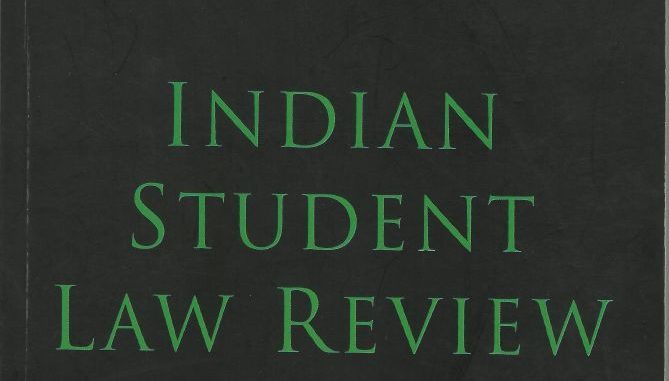Call For Papers: Indian Student Law Review [Submit by Feb 26]
About The Editorial Board of the Indian Student Law Review (ISSN 2249-439) is pleased to invite original, unpublished manuscripts for publication in the 2017-2018 issue of the journal in the form of Articles, Notes and Book Reviews. The contributions must be original and exclusive. They must not be slated for review or publication elsewhere. Mere submission of work… Read More »

About
The Editorial Board of the Indian Student Law Review (ISSN 2249-439) is pleased to invite original, unpublished manuscripts for publication in the 2017-2018 issue of the journal in the form of Articles, Notes and Book Reviews.
The contributions must be original and exclusive. They must not be slated for review or publication elsewhere. Mere submission of work does not guarantee publication as all manuscripts are subject to review by the Editorial Board. The Board reserves full rights in terms of the scrutinization, selection, and publication of the submitted manuscripts. The contributions should be strictly confined to the aforementioned framework.
Theme
The manuscripts must pertain to the field of Human Rights Law and its relation to other areas of law.
Sub-themes
- Human Rights and Disability Law (e.g. Lack of Access to differently abled people in various sectors)
- Human Rights and Intellectual Property Rights (e.g. Artificial Intelligence replacing human labor)
- Human Rights and Cyber Law (e.g. Social Media and Data Security)
- Human Rights and Labour Law (e.g. Human Rights Violations in the Unorganised Sector)
- Protection of Working Conditions of Migrant Labourers
- Employment Instability and Job Insecurity in Private Sectors
- Legal Issues concerning the plight of Manual Scavengers.
- Human Rights and Health Law e.g. When, if at all, is the state justified in limiting individual autonomy on the basis of public health considerations?
- Human Rights and Environmental Law (e.g. Degradation of Ecosystem Affecting the Rights of Indigenous People)
The contributions can be made on any sub-themes correlated to the main theme, Human Rights. The above-mentioned examples are not exhaustive.
Submission Guidelines
-
- The working font is Times New Roman. The main content must be font size 12 pt. The line spacing shall be 1.5. The footnotes shall be single-spaced with font size 10 pt. Argumentative and running footnotes are to be avoided.
- The numbers in the pages shall be consecutively marked on the right side bottom of the page.
- The paper shall commence with an Abstract of maximum 250 words. 5 Keywords have to be listed.
- Articles should (approximately) vary between 4000 words to a maximum of 6000 words excluding references.
- Notes shall be approximately 1000 words and shall not exceed 1500 words.
- Book Reviews shall be approximately 800 words and shall not exceed 1000 words.
- The contributor shall divide the papers into Sections, which also includes Sub-sections (core and allied components). A minimum of 4 components (not exceeding 6) shall be identified.
- Quotations shall be sparingly used. Unnecessary Italics and Bolds shall be avoided. Italics may be permitted for Principles / Doctrines, Maxims, Etymology and Case Laws.
- Avoid Capitalisation as much as possible except in cases of Legal Jargons, Terms, and Statutory Reference. For example, Articles, Section, Treaty, Resolution, Draft, etcetera.
- Abbreviations shall be used only in cases of frequent use. For example: If ‘United Nations’ is frequently used, then it shall be abbreviated to UN (in case of popular abbreviations, the contributor is requested to adhere to the known form of abbreviations, e.g. United Nations shall not be abbreviated to UniNat).
- Punctuations should be sparingly used. Single quotation marks must be used.
- In terms of cross-references, Supra and Infra can be selectively used.
- The contributions must strictly relate to verifiable data. Adequate information must be provided for the sources relied upon. In case of supportive sources, the due acknowledgment must be furnished.
- In general, sources from Newspapers and Magazines should be avoided. In select cases, based upon the requirement of the subject, it may be permitted.
- Co-authorship of maximum two people is allowed.
Contributions not adhering to the above-said rules shall be rejected.
- The Publishers Manual shall be strictly adhered to.
- All submissions should be sent to islr.soel2018@gmail.com
- The subject of the mail should read – (Article/Case Note/Book Review) – ISLR 2017-2018.
- A cover letter mentioning the name, name of the Institution, the name of the University, contact number should be attached separately in .doc or .docx format.
- The submission should be in either .doc or .docx format.
- A mail confirming the receipt of the entry and subsequently notifying selected works of Author(s) will be sent.
Deadline
The last date for submission of manuscripts is 26th February 2018.
Contact
Indian Student Law Review
islr.soel2018@gmail.com


